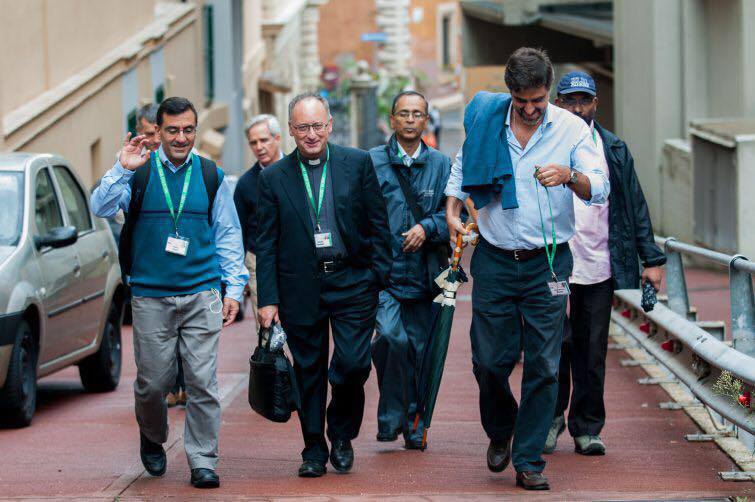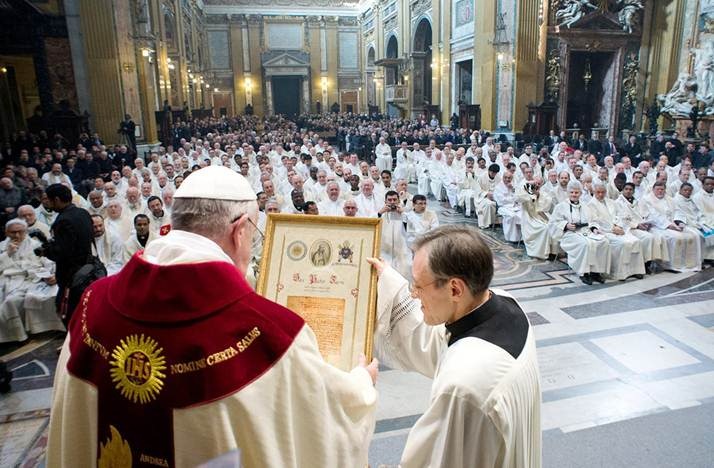 The 36th General Congregation of the Jesuits is under way in Rome. This assembly is the summit of the organizational structure of the Society of Jesus, and is composed of all the Provincials in charge and delegates from every religious province. The Congregation has elected the new Father General, Fr. Arturo Sosa. The other great task of the Congregation is to reflect on the life and mission of the Society in light of the «signs of the times». The history of the Society is not a history of abstract ideas, but of people immersed, for their mission, in the world. Therefore, the Society must read reality with discernment and understand how God moves in it and what he asks of us today for the «progress of souls». The 36th General Congregation is also the first to go on under a Pontiff who is a member of the same Order, who lives a special bond of obedience to the «successor of Peter and vicar of Christ on earth», as St Ignatius usually called him.
The 36th General Congregation of the Jesuits is under way in Rome. This assembly is the summit of the organizational structure of the Society of Jesus, and is composed of all the Provincials in charge and delegates from every religious province. The Congregation has elected the new Father General, Fr. Arturo Sosa. The other great task of the Congregation is to reflect on the life and mission of the Society in light of the «signs of the times». The history of the Society is not a history of abstract ideas, but of people immersed, for their mission, in the world. Therefore, the Society must read reality with discernment and understand how God moves in it and what he asks of us today for the «progress of souls». The 36th General Congregation is also the first to go on under a Pontiff who is a member of the same Order, who lives a special bond of obedience to the «successor of Peter and vicar of Christ on earth», as St Ignatius usually called him.
 But who are the Jesuits? Any historic experience that involves human beings is difficult to define because it is rich in life experienced. It is difficult, then, to talk in abstract terms about what a “society” of men is that, for almost 500 years, moves in the world with a common spirituality, but with many differences of culture, language, and origins among them. It is, first of all, a group of men: men who feel called to live a common venture because they have had a profound spiritual experience. This experience has moved them to concern themselves with two fundamental things: the «propagation of the faith» and the «progress of souls in Christian life and doctrine», as stated in the «formula of the Institute» approved for the first time by Paul IV in 1540.
But who are the Jesuits? Any historic experience that involves human beings is difficult to define because it is rich in life experienced. It is difficult, then, to talk in abstract terms about what a “society” of men is that, for almost 500 years, moves in the world with a common spirituality, but with many differences of culture, language, and origins among them. It is, first of all, a group of men: men who feel called to live a common venture because they have had a profound spiritual experience. This experience has moved them to concern themselves with two fundamental things: the «propagation of the faith» and the «progress of souls in Christian life and doctrine», as stated in the «formula of the Institute» approved for the first time by Paul IV in 1540.
In advancing its mission, the Society has not expressed a negative militancy as if it must combat an enemy or oppose a world perceived as irredeemably marked by evil. Suspicion and mistrust have never prevailed in the Society. To the contrary, since the beginning, where the Jesuits are found—both in Europe and in the missions—they have had a fertile relationship with cultures, even learning the languages and appreciating humanism, especially with their pedagogy. The motto that has guided them is that of Ignatius: «seeking God in all things».
 Their proverbial «militancy», then? It was understood and expressed well by Paul VI, then reappropriated both by Benedict XVI and Francis: «Wherever in the Church, even in the most difficult and extreme field, in the crossroads of ideologies, in the front line of social conflict, there has been and there is confrontation between the deepest desires of the human person and the perennial message of the Gospel, there too, there have been, and there are, Jesuits».
Their proverbial «militancy», then? It was understood and expressed well by Paul VI, then reappropriated both by Benedict XVI and Francis: «Wherever in the Church, even in the most difficult and extreme field, in the crossroads of ideologies, in the front line of social conflict, there has been and there is confrontation between the deepest desires of the human person and the perennial message of the Gospel, there too, there have been, and there are, Jesuits».
In the “guts” of the spirituality of the Society there is instead the intuition of a beyond, of a «more», of a magis, as it says in Latin . It grows in the praise of the glory of God, in the good, in positive action, in the desire for a more just and better world… This is why the militancy is expressed «under the standard of the Cross». The Society has, since the beginning, the seed of a «leaving», of a path forward.
 For this reason Pope Francis, in the interview that he did for La Civiltà Cattolica in August of 2013 told me that «the Society is an institution in tension, always fundamentally in tension. A Jesuit is a person who is not centered in himself. The Society itself looks to a center outside itself». And he continues: «The Society must always have before itself the Deus semper major, the always greater God, the pursuit of the ever greater glory of God» and «this tension takes us out of ourselves continuously». The Jesuit, therefore «must be a person whose thought is incomplete, in the sense of open-ended thinking»: «the Jesuit always thinks, again and again, looking at the horizon toward which he must go, with Christ at the center. This is his real strength. And that pushes the Society to be searching, creative and generous».
For this reason Pope Francis, in the interview that he did for La Civiltà Cattolica in August of 2013 told me that «the Society is an institution in tension, always fundamentally in tension. A Jesuit is a person who is not centered in himself. The Society itself looks to a center outside itself». And he continues: «The Society must always have before itself the Deus semper major, the always greater God, the pursuit of the ever greater glory of God» and «this tension takes us out of ourselves continuously». The Jesuit, therefore «must be a person whose thought is incomplete, in the sense of open-ended thinking»: «the Jesuit always thinks, again and again, looking at the horizon toward which he must go, with Christ at the center. This is his real strength. And that pushes the Society to be searching, creative and generous».
 The history of the Jesuits is determined by this tension, and is nevertheless a history of attempts and even mistakes. In its history, there is a lot of heroism and a lot of creativity, but there is also misery and infidelity to the Gospel, as in any group of human beings. But so many people flourished precisely in this history. Among them, there are at least 50 «saints» and about 150 «blessed»
The history of the Jesuits is determined by this tension, and is nevertheless a history of attempts and even mistakes. In its history, there is a lot of heroism and a lot of creativity, but there is also misery and infidelity to the Gospel, as in any group of human beings. But so many people flourished precisely in this history. Among them, there are at least 50 «saints» and about 150 «blessed»
(translation by Reyanna Rice of the original post)